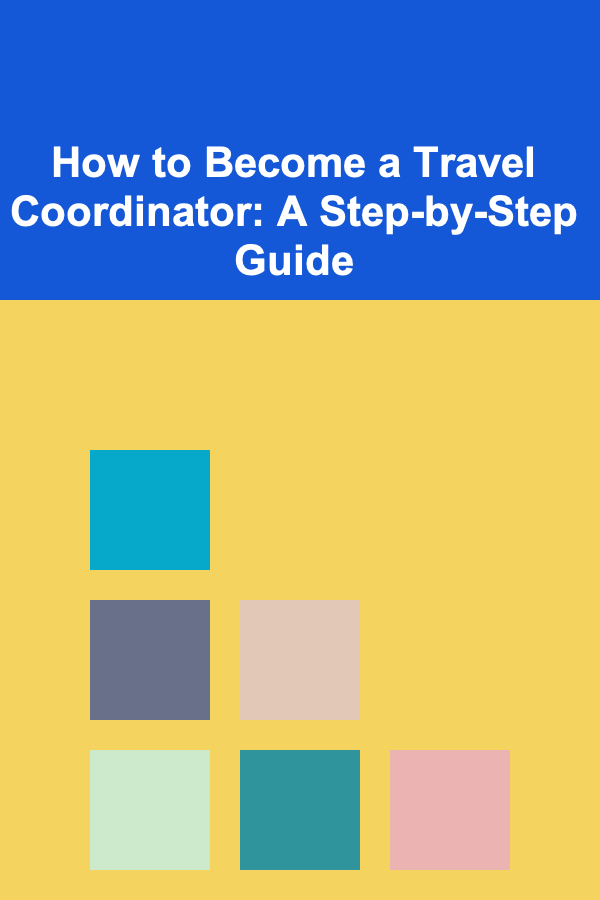
How to Become a Travel Coordinator: A Step-by-Step Guide
ebook include PDF & Audio bundle (Micro Guide)
$12.99$7.99
Limited Time Offer! Order within the next:

Travel coordinators play a crucial role in the smooth operation of any organization that requires regular travel, whether for business, events, or leisure. This career involves planning, organizing, and ensuring that all travel arrangements for employees, clients, or guests are well-executed and meet the necessary specifications. It combines attention to detail with strong organizational skills and the ability to work with various stakeholders, including travel agents, clients, airlines, and hotel staff. If you're looking to become a travel coordinator, this guide will walk you through the essential steps to get there.
What Does a Travel Coordinator Do?
A travel coordinator is responsible for organizing travel for an individual or group, ensuring that all arrangements are made efficiently, and within budget. Their duties typically include booking flights, arranging accommodations, providing itineraries, and assisting with any necessary documentation, such as visas or insurance.
In a business context, travel coordinators may arrange travel for executives or staff, managing everything from domestic flights to international travel. They also work to ensure that any special requests or preferences are accounted for, such as dietary restrictions, preferred airlines, or seating preferences.
Key Responsibilities of a Travel Coordinator
- Booking Travel: Organizing all aspects of travel, including flight tickets, train tickets, accommodation, car rentals, and even restaurant reservations.
- Managing Travel Budgets: Ensuring that travel plans adhere to the company or client's travel budget.
- Preparing Itineraries: Providing travelers with detailed itineraries, including flight schedules, hotel reservations, and local transportation details.
- Handling Travel Issues: Assisting with any problems during travel, such as flight cancellations or delays, and finding alternative arrangements.
- Ensuring Travel Compliance: Ensuring that all travel complies with company policies, safety standards, and any legal requirements, such as visa and health-related regulations.
Step 1: Assess Whether Travel Coordination Is Right for You
Before embarking on a career as a travel coordinator, it's important to consider whether this role fits your interests and skill set. Travel coordination requires organization, patience, communication skills, and the ability to handle high-pressure situations. Here are some qualities that successful travel coordinators typically possess:
- Strong organizational skills: You must keep track of various travel components, deadlines, and last-minute changes.
- Detail-oriented: Making sure that every aspect of travel is covered is essential to ensure a smooth experience.
- Excellent communication skills: Coordinators need to communicate with clients, travelers, airlines, and other service providers to ensure everything runs smoothly.
- Problem-solving abilities: Travel doesn't always go as planned, and being able to solve issues quickly is vital.
- Time management: Coordinating travel requires multitasking and the ability to manage multiple tasks and deadlines simultaneously.
If you feel comfortable handling logistics, working with various people, and maintaining calm under pressure, travel coordination might be the right career path for you.
Step 2: Obtain the Necessary Education and Qualifications
While a formal education is not always required to become a travel coordinator, many employers prefer candidates with relevant educational backgrounds or certifications that demonstrate an understanding of the travel industry.
Educational Background
Many travel coordinators hold a degree in hospitality management, business administration, or tourism. These programs provide a solid foundation in the skills necessary for this role, such as customer service, event planning, and financial management. However, you can also enter the field with a high school diploma or associate degree, depending on the employer's requirements.
- Hospitality Management or Tourism Degrees: These programs focus on travel planning, event coordination, customer service, and business management in the travel industry.
- Business Administration Degrees: A degree in business administration can be useful for handling budgets, contracts, and negotiations involved in travel coordination.
- Event Planning Courses: Travel coordinators often work closely with event planners, so knowledge of event logistics, budgeting, and vendor management can be a huge asset.
Travel Coordination Certifications
There are also certifications available that can demonstrate your expertise in the field and give you a competitive edge in the job market. While not always required, having these certifications can help build credibility with clients and employers. Some notable certifications include:
- Certified Travel Associate (CTA): Offered by The Travel Institute, this certification proves your knowledge in travel planning, customer service, and industry standards.
- Certified Travel Counselor (CTC): This is a more advanced certification for experienced professionals in the travel industry.
- Certified Meeting Professional (CMP): If you're interested in coordinating travel for events or conferences, this certification could be beneficial.
Step 3: Gain Experience in the Travel Industry
Most travel coordinators start their careers in entry-level roles within the travel industry to gain experience and develop the necessary skills. These roles provide hands-on experience with travel logistics, customer service, and planning.
Entry-Level Positions
- Travel Agent: Working as a travel agent gives you valuable experience in booking travel and understanding the logistics behind the process.
- Customer Service Representative: A customer service role at a hotel or airline can provide insight into handling client needs and travel issues.
- Event Assistant: Working as an assistant to event planners can provide exposure to travel-related event coordination, particularly if you're interested in planning for large groups or corporate events.
In these roles, you'll learn the technical aspects of travel coordination, including how to use travel booking software and work with clients to create personalized travel plans.
Internship Opportunities
Internships are another great way to gain experience in the travel coordination field. Look for internship opportunities with travel agencies, corporate travel departments, or event planning companies. Internships provide an opportunity to learn directly from professionals in the industry and can lead to full-time job offers.
Step 4: Develop Key Skills
In addition to the technical knowledge you gain through education and experience, there are several key skills that will help you thrive as a travel coordinator. These skills include:
1. Proficiency with Travel Booking Software
Travel coordinators often use specialized booking software to make reservations, compare prices, and manage travel itineraries. Familiarity with tools like Sabre, Amadeus, or Galileo can be extremely helpful.
2. Budgeting Skills
Being able to manage travel budgets is a key part of the role. Travel coordinators should be comfortable managing costs, negotiating prices, and finding cost-effective options for clients while ensuring that travel arrangements meet their needs.
3. Negotiation Skills
Negotiating with airlines, hotels, and other vendors to secure the best rates and packages is a major part of the travel coordinator's role. Strong negotiation skills are essential to keeping costs within budget.
4. Cultural Awareness
Since travel coordinators often handle international travel, understanding different cultures and customs can be an asset. This is particularly important when organizing travel for groups, as people may have different preferences or needs based on their background.
5. Time Management
Being able to prioritize and manage multiple travel arrangements simultaneously is a key skill for travel coordinators. Strong time management ensures that everything gets done on time and that any changes are addressed quickly.
Step 5: Apply for Travel Coordinator Positions
Once you've gained the necessary experience and skills, it's time to start applying for travel coordinator positions. These roles are often available in a variety of industries, including:
- Corporate Travel: Many large companies have in-house travel coordinators to manage the travel needs of employees and executives.
- Event Planning: Companies that organize large events, conferences, or meetings may hire travel coordinators to handle the logistics of travel for attendees.
- Travel Agencies: Travel agencies that specialize in group travel or corporate travel often employ travel coordinators.
- Non-Profit Organizations: Many non-profits that organize international projects or missions hire travel coordinators to manage the logistics of getting staff and volunteers to their destinations.
When applying for these positions, tailor your resume and cover letter to highlight your relevant skills and experience in travel coordination. Be sure to mention any certifications or specialized training you have in the field.
Step 6: Excel in Your Role
Once you've secured a position as a travel coordinator, it's time to focus on excelling in your role. Here are some tips for success:
- Develop Strong Relationships: Build strong relationships with travel suppliers, including airlines, hotels, and car rental agencies. These relationships can help you secure the best rates and ensure smooth travel arrangements.
- Stay Organized: Keep detailed records of travel arrangements, client preferences, and budgets. Using a digital or physical planner can help you stay on top of your responsibilities.
- Stay Up-to-Date: The travel industry is constantly changing. Stay informed about new travel technologies, industry trends, and regulations to provide the best possible service to your clients.
- Seek Feedback: Regularly seek feedback from clients and travelers to improve your services and adjust your planning process as necessary.
Conclusion
Becoming a travel coordinator can be a fulfilling and dynamic career path. With the right education, experience, and skills, you can manage travel logistics for individuals, groups, or organizations, ensuring that everything runs smoothly. By following the steps outlined in this guide, you can start your journey toward becoming a successful travel coordinator and carve out a rewarding career in the travel industry.
Reading More From Our Other Websites
- [Organization Tip 101] Step-by-Step Guide to Installing a Rustic Bathroom Vanity
- [Organization Tip 101] How to Make the Most of a Small Dining Area
- [Personal Care Tips 101] How to Choose the Right Toothpaste for Your Dental Needs
- [Home Budget Decorating 101] How to Decorate a Rental on a Budget Without Losing Your Deposit
- [Home Budget Decorating 101] How to Decorate with Books in a Budget-Friendly Way
- [Scrapbooking Tip 101] Best Seasonal Scrapbooking Ideas for Capturing Autumn Harvest Memories
- [Home Storage Solution 101] How to Optimize Closet Space with Adjustable Shelving Systems
- [Star Gazing Tip 101] Best Star‑Gazing Events in 2025: A Global Calendar
- [Personal Care Tips 101] How to Reapply Lipstick During the Day Without Messing It Up
- [Personal Investment 101] How to Track Your Investments Effectively: Tools and Strategies for Success

How to Build a Long-Term Rental Property Portfolio
Read More
How to Host a Themed Party That Will Impress Your Guests
Read More
Mindfulness in the Workplace: Strategies for Creating a More Meaningful and Productive Workplace
Read More
The Operations Manager's Handbook: Streamlining Processes for Peak Efficiency
Read More
How To Discover Breakthroughs in Robotic Surgery
Read More
10 Tips for Retirement Planning Checklist: Addressing Healthcare Costs
Read MoreOther Products

How to Build a Long-Term Rental Property Portfolio
Read More
How to Host a Themed Party That Will Impress Your Guests
Read More
Mindfulness in the Workplace: Strategies for Creating a More Meaningful and Productive Workplace
Read More
The Operations Manager's Handbook: Streamlining Processes for Peak Efficiency
Read More
How To Discover Breakthroughs in Robotic Surgery
Read More